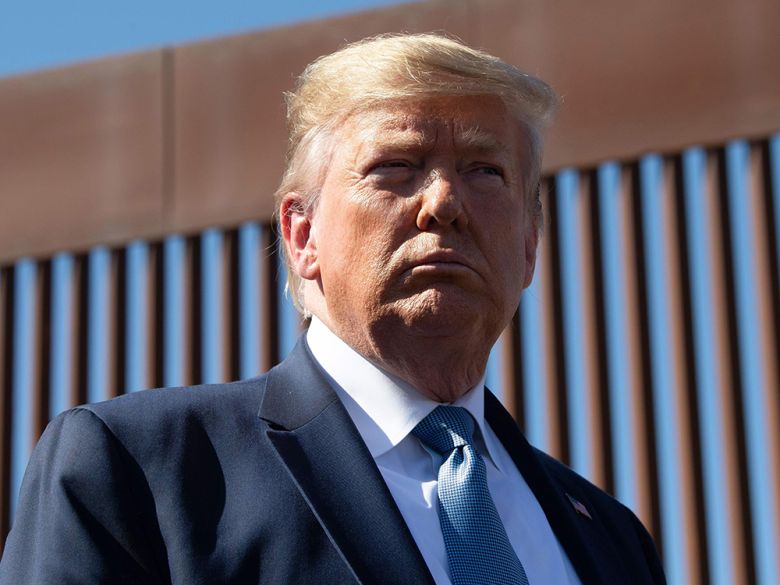Donald Trump is an enthusiastic threatener.
He threatens a lot. He threatens Congress, he threatens the press, he threatens allies, he threatens critics, he threatens people who work for him and people he can’t control. Issuing threats is his go-to response any time he can’t immediately get what he wants, which is often.
A lot of his most blood-curdling threats are directed at foreign countries. He threatened Iran with “obliteration” in June. He told Afghanistan that, if he chose, “Afghanistan would be wiped off the face of the Earth.” He could drop “the mother of all bombs” and “kill 10 million people.” Luckily, he added, “I don’t want to do that.” He told the United Nations he might be forced to “totally destroy” North Korea if tensions continued to increase.
Issuing threats is Trump's go-to response any time he can’t immediately get what he wants
He regularly threatens China with even more painful tariffs. He told European leaders he could dump captured Islamic State prisoners on their streets if their home countries refused them. He brandished the “ruination” of Canada’s economy if it didn’t agree to more U.S. trade demands.
Whether his threats achieve anything is debatable. He did get a new trade deal with Canada, though Ottawa probably would have supported a reasonable update anyway, and the pact looks unlikely to pass Congress as long as Trump is president. He’s stopped calling North Korea’s Kim Jong un “little rocket man,” and treats him as a worthy statesman, though there’s no sign of Pyongyang reducing its weapons programs. His battle with Beijing has mainly produced economic pain for both sides and increased global uncertainty.
One country that appears unmoved by Trump’s tactics is Iran. Tehran has been one of his favourite targets, most recently when he declared the U.S. was “locked and loaded” following the attack on Saudi Arabian oil installations that Washington blamed on Iran.

“I don’t want war with anybody but we’re prepared more than anybody,” he said.
There’s no question that the U.S. has the world’s most fearsome military, but Iran’s leaders may have noticed something else about Trump that doesn’t get as much attention as his threats: he is notably unenthusiastic about actual warfare. He was so keen to pull the small U.S. fighting contingent out of Syria that Defense Secretary James Mattis quit in protest. His eagerness to get U.S. troops out of Afghanistan was such that he invited Taliban leaders to the presidential retreat at Camp David, and only cancelled the plan when the Taliban showed its trustworthiness by triggering a bomb that killed a U.S. soldier and 11 other people. He initially approved an airstrike against Iranian targets in June in retaliation for shooting down a U.S. drone, but cancelled it at the last minute, suggesting the attack wasn’t intentional but “could have been somebody who was loose and stupid that did it.”
I don’t want war with anybody but we’re prepared more than anybody
U.S. President Donald Trump
If there is a Trump doctrine, it would appear to be the opposite of Theodore Roosevelt’s famed advice to “speak softly and carry a big stick.” The current U.S. president prefers to make a lot of noise, while reacting cautiously when the possibility of actual engagement arises. He is happy to operate through proxies, pledging ongoing support for Saudi Arabia in the face of its campaign against Yemen’s Houthi rebels, but is notably reluctant to become directly involved.
It may be that Iran has taken note. U.S. warnings did nothing to halt it from seizing oil tankers in the Persian Gulf over the summer, the latest on Monday despite Trump’s weekend threats. Notably, Trump was already softening his rhetoric, indicating, in direct contradiction to previous claims, that officials were still working to clarify who was behind the attack, and that he was waiting to hear from Saudi leaders before making any decisions. His remarks prompted a caustic response from Democratic presidential candidate Tulsi Gabbard, who tweeted: “Having our country act as Saudi Arabia’s bitch is not ‘America First.’ ”

Trump prefers deal-making, which he thinks he’s good at. He walked away from the Obama administration’s nuclear deal and ratcheted up sanctions, but fired John Bolton, the uber-hawk who advocated harsher moves, while mocking him as “Mr. Tough Guy.” As recently as a week ago he was willing to hold talks with Iranian leaders without preconditions, a position confirmed by both his Treasury Secretary and Secretary of State. When Iran’s Ayatollah Ali Khamenei said Tuesday that talks were out of the question, Trump, predictably, insisted he’d never been willing in the first place.
That Trump is capricious and unreliable is not news to anybody, and Iran appears more than willing to call his bluff, steadily escalating aggression in the region in the belief Washington will ultimately back off from any action that threatens U.S. lives. In doing so, of course, Trump only increases the danger of conflict in an area of the world that is already a tinderbox of bitter rivalries.
It’s a matter of obvious concern to Canadians, and it would be valuable to hear about it from the country’s leader, and potential leaders, as they campaign for election. But it’s unlikely to happen. So far the race has been more interested in which candidates wore racist makeup and made dumb remarks in the distant past. Liberal Leader Justin Trudeau plans to skip the only debate on foreign affairs. The one English debate he plans to attend now has six participants, ensuring much shouting and minimal chance of reasoned discussion. Voters interested in Canada’s international role will just have to hope future candidates take the world more seriously.
• Twitter: KellyMcParland

























